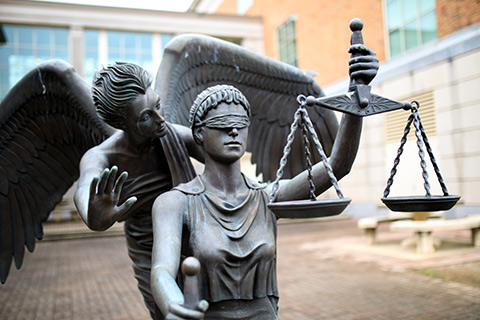
Ramona Albin
Ramona C. Albin, associate professor of law and director of advocacy programs, was named a junior faculty co-recipient of the 2021 Lightfoot, Franklin & White Faculty Scholarship Award. She was selected for her article “Appropriating Women’s Thoughts: The Admissibility of Sexual Fantasies and Dreams Under the Consent Exception to Rape Shield Laws,” 68 U. Kan. L. Rev. 617 (2020). The article examines the admissibility of victims’ thoughts, imagined or even unconscious, as evidence of consent in sexual assault cases and argues that such evidence is not relevant to consent, should be excluded, and proposes a practical solution to address this problem.
In June, Albin participated in a panel titled “Advocacy Scholarship,” at the Educating Advocacy Teachers Conference hosted by Stetson University School of Law. She was also a contributor to a National Institute of Trial Advocacy publication on Trial Preparation.
Brannon P. Denning
Brannon P. Denning, Starnes professor of law and director of faculty research and development, was selected as the senior faculty recipient of the 2021 Lightfoot, Franklin & White Faculty Scholarship Award for his article “Have Gun—Will Travel?”, 83 L. & Contemp. Prob. 97 (2020). The article discusses regulations of the transport of personal weapons to shooting competitions or to someone's second home and how these regulations involve not just the Second Amendment right to keep and bear arms, but also the right to travel. The article also concludes that such cases involving so-called "hybrid rights" is a reason for courts to apply a heightened standard of review.
Kerry McInerney
Kerry McInerney, director of Cumberland’s online master’s programs and adjunct professor of law, earned his certification as an online instructional design peer reviewer after completing the rigorous Quality Matters training program. In addition, McInerney was selected to join a distinguished group of Samford faculty to present at an upcoming mini conference on Teaching and Learning. McInerney has been an instructor and academic adviser for the online master’s programs since 2016 and joined Cumberland School of Law full- time in 2019. He teaches courses in Mediation, Risk Management & Regulatory Compliance, Banking Law & Regulation in the U.S., Mortgage & Securities Regulatory Compliance, Legal Writing & Communication Skills, the Business of Law, and the Capstone course in the master’s program.
Jeff Anderson
Jeff Anderson, assistant professor of law and director of the Lawyering and Legal Reasoning program, won the Harvey S. Jackson Excellence in Teaching Award for faculty teaching first-year courses. Anderson joined Cumberland School of Law as a full-time faculty member in 2020. He teaches Civil Procedure, LLR, and Legislation.
William G. Ross
William G. Ross, the Albert P. Brewer professor of law and ethics, won the Harvey S. Jackson Excellence in Teaching Award for upper-level courses. Ross has been a member of the faculty since 1988. The courses he teaches include Constitutional Law, Civil Procedure, American Constitutional History, Professional Responsibilities and Selected Topics Courses in Constitutional Law.
Tim McFarlin
In February, associate professor Tim McFarlin presented his project called “The Rhythm of Copyright” at this year’s virtual Works-in-Progress Intellectual Property Colloquium organized by American University Washington College of Law, Texas A&M University School of Law, and the University of Utah S.J. Quinney College of Law. Last summer, the Saint Louis University Law Journal published McFarlin’s essay, “Using Open-Source, Collaborative Online Reading to Teach Property,” 64 St. Louis U. L.J. 355 (2020), in a special issue focused on teaching property law.
Tracey Roberts
Tracey M. Roberts, associate professor of law and director of assessment, was named a junior faculty co-recipient of the 2021 Lightfoot, Franklin & White Faculty Scholarship Award. Roberts was selected for two of her articles. In “Stranded Assets and Efficient Pricing for Regulated Utilities: A Federal Tax Solution,” 11 Columb. J. Tax L. 1 (2019), Roberts argues for a change in tax and regulatory rules that will eliminate waste and offset stranded assets claims by crediting regulated utilities with those tax savings and their returns. “Greenbacks for the Green New Deal,” 17 Pitt. Tax Rev. 53 (2019), which was solicited by the tax faculty at the University of Pittsburgh, examines plans for the Green New Deal and deep decarbonization, describes the economics driving public investment in these resources, and clarifies the types of funding mechanisms that are likely to limit economic waste and encourage efficient outcomes as the country moves forward toward a carbon-neutral future.
In June, she presented her paper, “The Perils of Private Governance,” virtually at the ComplianceNet Conference, University College London (June 29) and at the EPCR/RegGov Conference at Exeter University (June 25). She presented “Monopsony, Wages, and the Incidence of the EITC,” virtually at the Poverty Law Workshop at American University Washington College of Law (June 22) and at the 2021 Junior Tax Scholars Workshop (June 11).
In May, she presented “The Procedural (and Political) Pathway to the Carbon Tax,” virtually at the Law and Society Association (May 29). She presented “Carbon Dividends and the Political Philosophy of Claims to the Global Commons,” virtually at the Sixth Annual SRP Sustainability Conference of American Legal Educators at Arizona State University Sandra Day O’Connor College of Law (May 14).
In 2020, she was honored to participate in the Sabin Center for Climate Change Law Legal Pathways to Deep Decarbonization Project at Columbia University. As the director of assessment, Roberts oversaw the administration of the 2021 Law School Survey of Student Engagement at Cumberland School of Law this spring.

